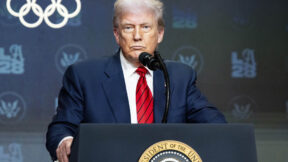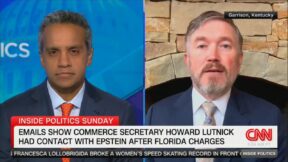NYT Public Editor Scolds Two Ethically-Challenged Times Writers
 New York Times public editor Clark Hoyt was not messing around this weekend, as he used his Sunday column to highlight and explain in detail the ethical shortcomings of two recent Times articles. Doing his job with gusto, Hoyt took to task Charles DeLaFuente, a copy editor who used a column space to complain about his own JetBlue airline mishap, and Suzy Buckley, the freelance travel writer caught plugging her long-term boyfriend’s Miami restaurant. That may look like a friendly face, over there to the left, but public editors mean business.
New York Times public editor Clark Hoyt was not messing around this weekend, as he used his Sunday column to highlight and explain in detail the ethical shortcomings of two recent Times articles. Doing his job with gusto, Hoyt took to task Charles DeLaFuente, a copy editor who used a column space to complain about his own JetBlue airline mishap, and Suzy Buckley, the freelance travel writer caught plugging her long-term boyfriend’s Miami restaurant. That may look like a friendly face, over there to the left, but public editors mean business.
“These two items on successive Sundays late last month showed what can go wrong when journalists get too personal,” Hoyt wrote.
DeLaFuente used the Complain Box column — a space to write about “broader irritations of life, like loud music on the subway” — to kvetch specifically about a customer service incident, abusing his power along the way. One editor said the column “was like writing on New York Times stationery and then sending it out to a million and a quarter people.” Hoyt said, “The Times does not need the appearance that its journalists are using Complaint Box to air self-serving gripes.”
Buckley’s case, meanwhile, was a bit more controversial, and her ethical blunder a bit more egregious:
A Miami reader called attention to Buckley’s relationship with Joshua Woodward, the co-owner of the 8 oz. Burger Bar. It had been publicized earlier after Woodward was arrested in Los Angeles on suspicion of causing the miscarriage of a child believed to be his by another woman.
Mediaite first noticed the Buckley fiasco via NYTPicker, though Hoyt notes that Buckley was ineligable to write for the Times at all, because she has gone on free press junkets as a travel reporter.
Plus, the Times ethics manual is pretty clear on the matter of shilling for loved ones:
No journalist may report for us about any travel service or product offered by a family member or close friend.
No gray area there, Gray Lady. Hoyt closed his column thusly:
In the end, there is a bright line here. Journalists cannot use the power of The Times, or any newspaper, for what can be construed as personal purposes. It is simply wrong to look as if you are getting even with a company, or writing a plug for family or friends.
Public editor, out.
New: The Mediaite One-Sheet "Newsletter of Newsletters"
Your daily summary and analysis of what the many, many media newsletters are saying and reporting. Subscribe now!






Comments
↓ Scroll down for comments ↓